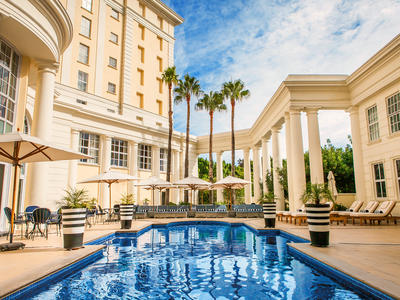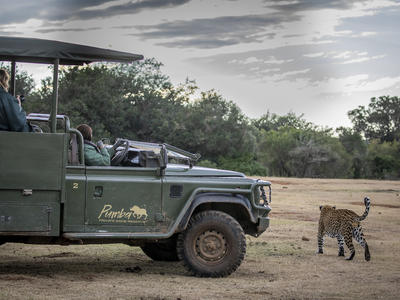
Cape Town & Eastern Cape Safari
Overview
| Start | Accommodation | Destination | Duration | Basis |
|---|---|---|---|---|
| Southern Sun Cullinan Hotel | Cape Town | 5 nights | B&B | |
| Pumba Msenge Bush Lodge | Pumba Private Game Reserve | 3 nights | FB |
Destinations
Cape Town
Set at the confluence of the Indian and Atlantic oceans and backed by the iconic Table Mountain, the bustling city of Cape Town presents an alluring combination of drawcards. Incredible powdery white beaches, highly acclaimed wine routes, and astonishingly beautiful mountain trails surround a cosmopolitan hub. This diverse metropolis is filled with superb shops and restaurants, extraordinary heritage monuments, a multitude of entertainment venues, and a spectacular, chic waterfront harbour. Highlights include the Zeitz Museum of Contemporary African Art; Table Mountain's jaw-dropping views; Boulders Beach, where penguins might swim right up to you in the warm Indian ocean waters; the Kirstenbosch Botanical Gardens, where you can walk along a treetop canopy among incredible native flora or watch an open-air concert at the base of the mountain; Robben Island, where visitors can see the cell where Nelson Mandela was imprisoned for 18 years; and many more.
Pumba Private Game Reserve
Pumba Private Game Reserve, set against the beautiful Eastern Cape landscape, is the perfect destination for a Big Five African Safari. Experience Africa’s wildlife in their natural habitat, from the rare white lion to hippo, hyena, giraffe, wild dog, and cheetah, as well as 21 antelope species and over 250 bird species. The area provides amazing photographic opportunities of the beautiful Cariega River floodplain, complete with waterholes, as well as of the magnificent Zuurberg Mountains. Activities include fishing, birding safaris, guided bush walks, and stargazing.
Accommodation
Map
Information
One of the most culturally and geographically diverse places on earth, South Africa, fondly known by locals as the 'Rainbow Nation', boasts 11 official languages, and its inhabitants are influenced by a fascinating mix of cultures. Discover the gourmet restaurants, impressive art scene, vibrant nightlife, and beautiful beaches of Cape Town. Enjoy a local braai (barbecue) in the Soweto township, browse the bustling Indian markets in Durban, or sample some of the world's finest wines at the myriad wine estates dotting the Cape Winelands. Some historical attractions to explore include the Zululand battlefields of KwaZulu-Natal, the Apartheid Museum in Johannesburg, and Robben Island, just off the coast of Cape Town. Above all else, its untamed wilderness is astonishing: wildlife roams freely across massive unfenced game reserves such as the world-famous Kruger National Park.
banking
Currency
Local currency: South African Rand
Symbol: R
ISO code: ZAR
Subunit: Cent (1/100 of a Rand)
Banknotes: R10, R20, R50, R100, R200
Coins: 10c, 20c, 50c, R1, R2, R5
Banking
Card Transactions: Widely accepted
ATMs: Yes
Mastercard: Yes
Visa: Yes
American Express: Yes
Diner’s club: Yes
Banking Hours: Weekdays: 09:00 – 15:30
Weekend: Saturdays: 08:30 – 11:00
Public Holidays: Closed
Foreign exchange services: Yes
transport
Air:
Main airlines: South African Airways, Comair
International Airports: O.R. Tambo (Johannesburg), Cape Town International, King Shaka (Durban)
Domestic Airports: Numerous across the country
Road:
Driving on the: Left
Tar roads: Yes, well-maintained in most areas
Gravel roads: Yes, especially in rural areas
Valid International Driver's License needed: Yes
Car hire available: Yes
Taxis: Yes
E-hailing services: Yes, including Uber and Bolt
Bus:
Inter-city bus services: Yes
Local city bus networks: Yes
Rail:
Railway system: Yes, including luxury options like the Blue Train
Subway System: Gautrain in Gauteng
Water:
Ferries: Limited, mainly in coastal cities
Water taxis: No
Leisure cruises: Yes, especially from Cape Town and Durban
dress
Spring and Summer
Cool, light, breathable and comfortable: Yes
Lightweight warm clothes: No
Winter and Autumn
Jerseys, cardigans, sweaters, jackets: Recommended
Heavyweight clothing and boots: Yes
General
Umbrella and raincoat: Yes, during the rainy seasons
Warm gloves, hat and scarf: In winter, particularly in high-altitude areas
Swimming costume (bathing suit): Yes
Hat, sunglasses, and sunblock: Essential
Walking shoes: Yes
Casual: Yes
Smart-casual attire: Yes
cuisine
Food and water safety:
Can you drink the tap water: Yes, in most urban areas
Fresh fruit and veg: Yes
Ice: Yes
Meat: Yes
Street food: Yes, widely popular and generally safe
Local cuisine:
South African cuisine is diverse and flavorful, featuring dishes like biltong (dried, seasoned meat), bobotie (spiced minced meat baked with an egg-based topping), and boerewors (farmers' sausage). The culinary scene includes a strong tradition of barbecuing, known locally as "braai."
Drinks:
Notable local drinks include Rooibos tea, craft beers, and South African wines.
Tipping: Customarily 10-15% in restaurants and for services.
electricity
Plug Type: M, N
Voltage (V): 230 V
Frequency (Hz): 50 Hz
*A travel plug adapter and voltage converter might be necessary depending on your appliances.
climate
Annual rainfall: Varies widely, Cape Town (winter rainfall, 515 mm), Johannesburg (summer rainfall, 713 mm)
Average temperature: Varies, Cape Town 17°C, Johannesburg 15.5°C
Summer:
Average highs: 28°C (Cape Town), 26°C (Johannesburg)
Average lows: 16°C (Cape Town), 15°C (Johannesburg)
Winter:
Average highs: 18°C (Cape Town), 17°C (Johannesburg)
Average lows: 8°C (Cape Town), 4°C (Johannesburg)
Best time to visit:
The best time to visit South Africa is from May to September for wildlife viewing, as animals are more concentrated around water sources. For beach holidays, mid-December to March is ideal, especially in Cape Town.

